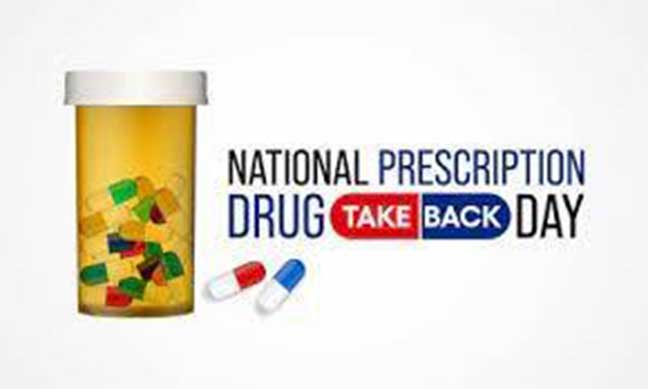National Prescription Drug Take Back Day 2023

Medically Reviewed By: Manish Mishra, MBBS
To reduce rates of prescription drug misuse and overdose, the Drug Enforcement Administration (DEA) established National Prescription Drug Take Back Day. Taking place April 22nd, 2023, this event encourages people to safely dispose of unneeded medications at local collection sites.

When discussing the drug overdose crisis in Ohio and the rest of the country, some people focus on illegal drugs like heroin and meth. However, many overdoses also involve prescription drugs, especially opioids.
That’s why the Drug Enforcement Administration (DEA) established National Prescription Drug Take Back Day. Here’s what you should know about this important event.
What Is National Prescription Drug Take Back Day?
On National Prescription Drug Take Back Day, law enforcement and other authorized collectors set up collection sites where people can safely dispose of expired or unneeded medications. This year, it takes place on April 22nd between 10 am and 2 pm.
The DEA hosts this event twice a year, once in April and once in October. Because it encourages the safe disposal of medications, it helps prevent dangerous substances from getting in the wrong hands.
Indeed, many people who are addicted to prescription opioids, prescription stimulants, or other prescription medications first got the drugs from a friend or family member’s medicine cabinet.
By participating in National Prescription Drug Take Back Day, you can help fight addiction and overdose deaths in your community.
How To Participate In National Prescription Drug Take Back Day
To participate in the event, all you have to do is visit a collection site and place your unused prescription drugs in one of the drop boxes. You can find a local collection site by searching the DEA’s official locator.
You may drop off various types of prescription and over-the-counter medications, including:
- pills
- capsules
- vials
- ointments
- creams
- patches
- inhalers
- non-aerosol sprays
All liquids must be in their original containers. You may only drop off controlled substances (such as opioids) if you were legally prescribed the substance for your own use or for the use of a household member or pet.
You may not drop off the following items:
- illegal drugs
- medications that contain iodine
- sharps/syringes
- any items that contain blood or other bodily fluids
- aerosol cans
- mercury thermometers
- vape pens or e-cigarette devices with non-removable batteries
- personal care products, such as shampoo, soap, or lotion
- household hazardous waste, such as paint, pesticides, or oil
Other Drug Disposal Options
If you miss the event, there are other ways to safely dispose of your unused drugs. Although many drop-off locations only operate on Drug Take Back Day, others operate all year long.
To find a location in your area, search the DEA’s directory of Controlled Substance Public Disposal Locations or call the DEA Diversion Control Division Registration Call Center at 1-800-882-9539.
These permanent collection sites exist in many settings, including pharmacies, hospitals, and law enforcement facilities. Some sites will even collect medications through the mail.
Throw It Out
If you can’t find a collection site in your area, and if the medication’s label lacks disposal instructions, the DEA recommends that you remove the medicine from its container and mix it with an undesirable substance, such as kitty litter or used coffee grounds. Next, put the mixture in a sealable bag or other leak-proof container, and place it in the garbage.
You can also put the medication’s original container in the recycling bin or trash. Scratch out your name, address, and other personal information to protect your privacy.
Don’t Flush It
Some people flush unwanted medications down the sink or toilet. While this option might seem convenient, drugs can contaminate the water supply. That’s why you should not flush them unless the medication’s label specifically instructs you to do so.
Also, some communities prohibit residents from flushing medications, so check your local laws before doing so.
Other Ways To Prevent Prescription Drug Misuse
Prescription drug misuse occurs when you use a prescription drug in a manner not prescribed by your healthcare provider.
For example, you might take higher doses than prescribed, take it more often than prescribed, or take it without a prescription. This behavior often leads to addiction, overdose, or other health problems.
Safely disposing of unwanted medications is not the only way to help prevent prescription drug misuse. You should also:
- keep a log of all prescription and over-the-counter medications in your home, including the number of pills in each bottle
- store all medications in lockable containers out of a child’s reach
- never share your medications with other people
If you or someone you love struggles with prescription drug misuse, please reach out to Ohio Recovery Center. Our inpatient addiction treatment programs offer medical detox, behavioral therapy, and other evidence-based services to help you or your loved one stay healthy.
- Drug Enforcement Administration — HOW TO PROPERLY DISPOSE OF YOUR UNUSED MEDICINES https://www.dea.gov/sites/default/files/2018-10/Proper%20Disposal%20Flier%20%28October%202018%29.pdf
- Drug Enforcement Administration — National Prescription Drug Take Back Day https://www.getsmartaboutdrugs.gov/gsad/national-take-back-day
- Drug Enforcement Administration — Take Back Day https://www.dea.gov/takebackday#collection-locator
- Food and Drug Administration — Drug Disposal: Drug Take Back Locations https://www.fda.gov/drugs/disposal-unused-medicines-what-you-should-know/drug-disposal-drug-take-back-locations

